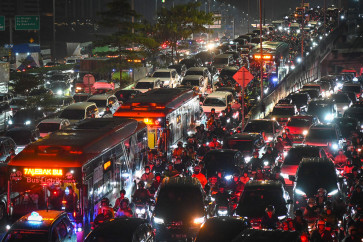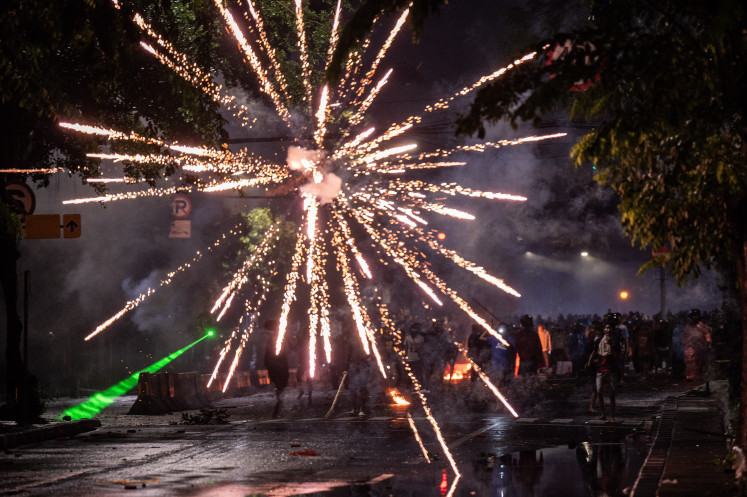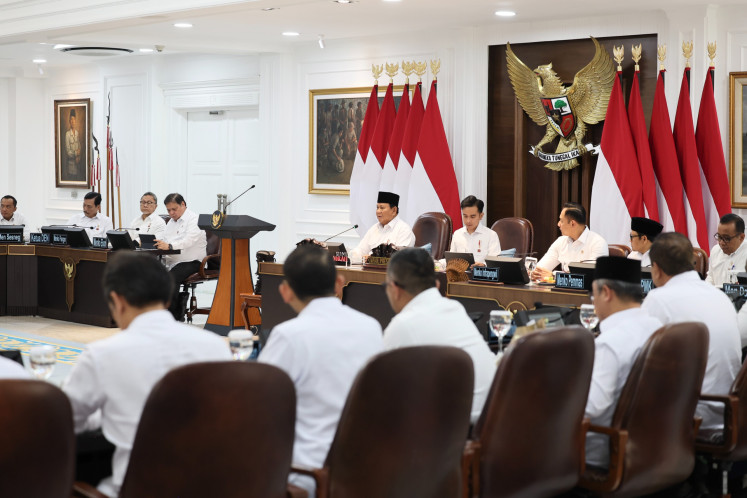Popular Reads
Top Results
Can't find what you're looking for?
View all search resultsPopular Reads
Top Results
Can't find what you're looking for?
View all search resultsThe woe of Samarinda
In a Makroman farming district, half an hour from the center of Samarinda, the chirps and quacks of fowl in rice paddies compete with trucks’ roaring engines
Change text size
Gift Premium Articles
to Anyone
I
n a Makroman farming district, half an hour from the center of Samarinda, the chirps and quacks of fowl in rice paddies compete with trucks’ roaring engines.
Samarinda’s administration gave a mining company permission to dig up the earth in the capital’s farming area in 2007. A year after the mine operated, chemicals from the mine seeped into farmers’ water source and entered fish ponds and rice paddies, causing farmers’ yield to fall to half of its original production output, according to Baharudin, a leader of the local farming group.
East Kalimantan has experienced a mining boom in the past decade. The boom has brought foreign and local investors to the area. The pervasiveness of the mining industry is most pronounced in the capital, Samarinda, where mining concessions are granted without the consideration of the local community.
In 2009, the House of Representatives passed the law on mineral and coal that limited regional administrative power in the issuance of mining permits. Before regional powers were limited in the concession licensing, Samarinda issued 38 new licenses between 2005 and 2009, according to data from the Mining Advocacy Network (JATAM), giving the city a total of 76 mining concessions.
The mining concessions area more than doubled from around 20,000 hectares to more than 50,000 hectares. The mine that polluted Makroman farmers’ rice paddies and fishponds was one of these concessions.
More than 70 percent of Samarinda’s area has been allocated to mining concessions. They have reached the residential areas too. In Makroman, the mines are next to rice paddies. In Loa Kulu, a mine pit is behind an elementary school. In 2009, resident’s houses in Loa Kulu were destroyed due to a landslide caused by mining activities.
When The Jakarta Post visited the area, the pit had been covered with soil. However, in 2012 more than 100 pits around the city were yet to be reclaimed according to data from Samarinda’s Environmental Agency.
East Kalimantan JATAM coordinator Kahar Al Bahri said that the Samarinda administration maneuvered the 2009 law on mineral and coal through the property business, an area where land is also in the hands of private companies.
He said that even after the 2009 law on mineral and coal was passed, new mines still opened up. The
Samarinda administration gave rights of resources to property developers that found coal on their land, Kahar said.
“If the property developers find coal on their land they can exploit the source first and then build property,” he said. In fact, some property developers were not interested in building houses at all but used this loophole to get to the coal, Kahar added.
Recently, the Constitutional Court ruled that regional administrations have the right to issue permits, after Kutai Timur regency, which is also part of East Kalimantan and home to mining concessions of Kaltim Prima Coal of Bumi Resources, requested a judicial review.
Samarinda’s leaders say they are striving for damage control. Since taking office on Nov. 23, 2010, the “political commitment” was to cease the issuance of new mining business permits, said Deputy Mayor Nusyirwan Ismail.
With so many concessions already — and with the city’s rapid development and its population of over 926,000 — environmental conflicts are becoming “highly sensitive”, Nusyirwan said. The district of North Samarinda is of particular concern, with further growth expected with the new airport.
As for mine hunters in the guise of property developers, the official said procedures were being tightened in the issuance of land permits.
Integrated teams check the area prior to property work and any suspected activity other than property development is reported to the police. The result of regular inspections are announced and published through the media on the 25th of every month, Nusyirwan added.
The procedures carried out since last February have resulted in the revocation of permits of four companies, he said. The announcements also include the companies that are operating well and not damaging the environment; those that gained written warnings, those whose operations are suspended for a month during which the surrounding environment must be repaired; and those whose permits would be revoked if progress was considered below 70 percent after one month.
JATAM representative Kahar argues that the environmental and safety control over the mines remains lax. Many of the pits excavated close to residential areas have been abandoned without reclamation, often with fatal consequences. Five children fell in abandoned mine pits filled with water in 2011 in Sambutan district. Two of the children died.
Back in Makroman, Komari, 70, a farmer who has worked the land for nearly 30 years, said that the water had changed in his area, affecting his produce.
“In the old days, it was so clear,” he said while walking barefoot among the rice paddy.
“I used to produce 8 tons [of rice]. Now, if we can produce 4 tons, we consider ourselves lucky,” he said.
Komari said that there had been little support for farmers. At the JATAM office, Kahar said that many politicians in the Samarinda and East Kalimantan council had a vested interest in mining, as they or their families were in the business.
Komari’s house is within Samarinda city limits, but the family is still not connected to the power grid. A generator is used to light the house at night and to power the water pump.
JATAM has been advocating for the rights of farmers in Makroman since 2008. Kahar muses about the lack of electricity there.
“Isn’t it ironic that we’re sending our coal overseas to power other countries’ power plants and next
to the coal mines here, houses are powerless?”
— JP/Prodita Sabarini and Nurni Sulaiman










